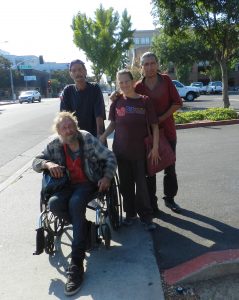
Every Stanislaus County Supervisor supported Donald Trump, as did most local politicians, including Jeff Denham. Lately, many have been hearing complaints about the president’s support for racists and Nazis as well as criticism of his appointees.
Just before the Stanislaus County Supervisor’s meeting of August 22, a supervisor was heard telling a friend he was, “tired of hearing about Donald Trump.” He added, “What does Donald Trump have to do with local politics anyway?”
Just a few hundred yards away, four homeless people were rising from their sleeping places and beginning a slow march across town. They gave their names as Larry, Elton (known as “Bert”), Richard, and Maria. Their progress was slow because Bert is confined to a wheelchair.
Three members of the group said they receive disability payments. When asked why they don’t use the money for housing, Maria replied, “We can’t find a place cheap enough.”
Since they had been sleeping near the now-notorious studios at 624 Ninth Street, someone asked whether they had ever thought of staying there.
“I was there once,” said Maria. “After three days I couldn’t stand it and had to get out.”
Most anyone familiar with conditions in the condemned building could easily understand Maria’s disgust. Vermin, filth, crime, stench, and decay only begin to describe the horrifying conditions, some tenant-caused, others the result of owner-neglect. Yet 624 Ninth Street was one of a tiny few places poor people could afford to rent. Studios rent from $575 to $585 a month.
Homeless people often have incomes. Sometimes they rent motel rooms with their money. They usually have enough for a couple of weeks, then they’re back on the streets.
The behavior seems crazy until one understands the hard realities of homelessness. Absent money for housing, money becomes a short-term tool—it’s mostly good for temporary comforts like drugs, alcohol, motel rooms, and cheap fast food.
Social security payments and disability compensation have not kept pace with rising housing costs. Frequently, people on disability receive a little more or less than $900 dollars a month. Israel Gonzalez, now awaiting housing after the condemnation order for 624 Ninth Street, receives $895 dollars a month in Social Security benefits after a lifetime of hard work in the fields and canneries.
One of the major factors in homelessness, cuts in the budget for Housing and Urban Development (HUD), is almost never discussed. The cuts began under Ronald Reagan and have invariably had a crippling effect on the poorest of the poor among us.
Ben Carson, President Trump’s choice to lead HUD, has said poverty is a state of mind. He’s offered no public opposition to proposed cuts of $7 billion in the HUD budget:
“Participants in the Section 8 voucher program would need to pay at least 17 percent more of their income toward rent, and there’d likely be a couple hundred thousand fewer vouchers nationwide (and 13,000 fewer in New York City). Capital funding for public housing would be slashed by a whopping 68 percent…”
Section 8 housing provides housing subsidies for low income people. Fewer vouchers will inevitably result in more homeless people.
Fifty years ago, if someone had said we were going to stop providing care for the destitute mentally ill and cut funds for housing the poorest among us, most rational people would have expected a rise in homelessness—and that’s exactly what happened.
The Trump administration, largely unnoticed, is cutting some of the last shreds of an already tattered social safety net, and no rational person should expect anything but even more homelessness as a result. And that’s what Donald Trump has to do with local politics.

It’s a catch 22 situation. Assistance may be somewhat more generous in California, but housing costs are exorbitant. Trump’s cuts will exacerbate the situation, dooming the county’s initiative on homelessness to a lack of success. It’s sad to see a community energized about an issue, but frustrated by draconian cuts at the federal level.
Cutting food stamps, how dumb is that? Even farmers, usually extremely conservative, are against that… because it is used as a means to dispose of excess food generated by the agricultural price support programs (subsidies for farmers).
We used to have a war on poverty; now we have war on the poor.